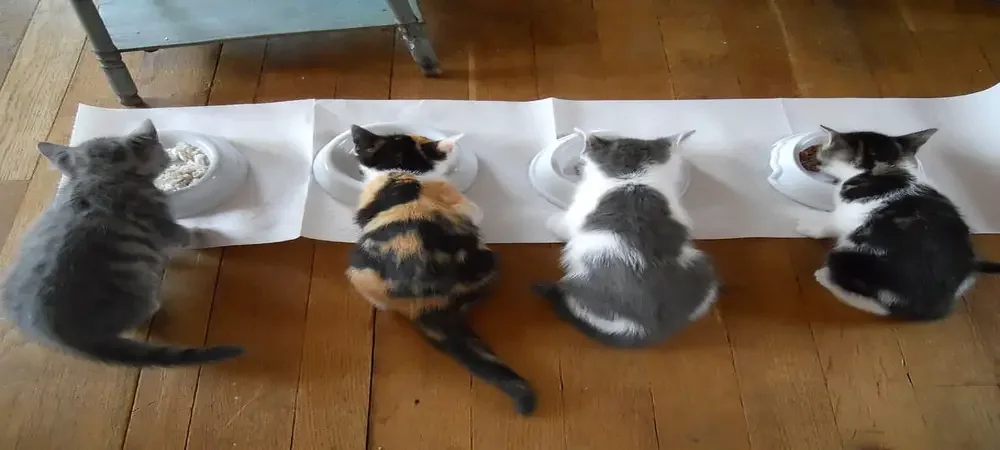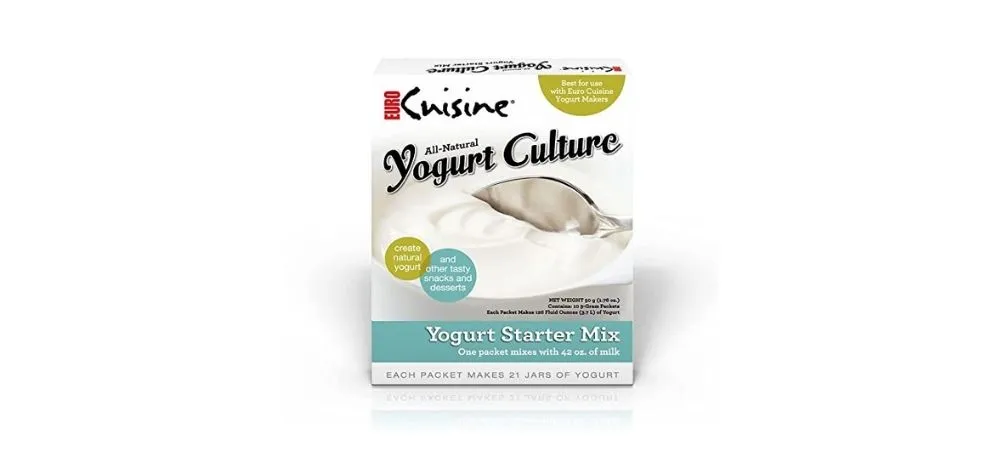The simple answer to the question of can cats eats yogurt is Yes! However, like most things, there are some cautions and it depends on what type of yogurt you give your cat and how much. The benefits of yogurt for cats are that it has a high protein count, contains live active cultures such as Acidophilus, Bifidus, Lactobacillus, and Streptococcus Thermophilus.
But does these probiotics are beneficial for your cat as well? Let’s check out!
| These beneficial cultures are said to promote a healthy digestive system by suppressing the growth of harmful bacteria in the intestines and help to balance intestinal microflora. If your cat is suffering from constipation or diarrhea these live active cultures can be helpful as well. But, if your cat is lactose intolerant, it may upset its GI. |
What Types of Yogurt Can Cats Eat?
Cats can eat plain low-fat yogurt that is meant for human consumption. If there are any added sugars or sweeteners they should be avoided as these can make your cat sick. Plain unsweetened yogurt will have less lactose, which is more easily digested by cats.
So it is better to choose the plain over flavored varieties if you are not sure which type to go with. Another option that is available in most grocery stores these days is Greek yogurt. Plain Greek yogurt is low on whey and has a thicker consistency than other types of yogurt due to the straining process used to make it.
How Much Yogurt Should I Feed to My Cat?
Well, The amount of yogurt to feed your cat is the ultimate key! Overfeeding may lead to adverse results. You should not feed more than 3-5 teaspoons of yogurt to your cat in a week. After eating yogurt, if your cat experiences any vomit or diarrhea, it can be a sign of a yogurt allergy. Your cat may be intolerant to dairy and you should consult with your vet.
Greek Vs Regular Yogurt

Greek yogurt is a common food item often used as a low-calorie and high-protein yogurt containing lesser whey than regular yogurt. It comes in many flavors and varieties, but the only difference between plain Greek yogurt and regular yogurt is that Greek yogurt has been strained to remove liquid whey which gives it its creamy consistency.
The other difference is that when you remove the liquid whey there is more protein and less sugar left in the yogurt. Greek yogurt is a good choice but make sure to serve them in smaller quantities. To begin with, start feeding 1 teaspoon of yogurt to your cat to check its effects. Do not feed more than 1 teaspoon of Greek Yogurt as it may cause diarrhea and other stomach issues.
Why do Cats Love yogurt?
Cats tend to go crazy for yogurt of any kind. Their love of this dairy product is often attributed to the fact that commercial cat food has an abnormally low amount of L-taurine, so cats are getting a craving for something they need in their diet but can’t easily get from their food.
Taurine is important for cats because it maintains a healthy heart, eyes, and reproductive system. Cats cannot manufacture taurine in their bodies; they must get this vital nutrient from their food.
Yogurt is an easy way to give your cat the extra taurine she needs on a daily basis without supplying too many calories or carbohydrates.
Some of the recommended Cat Yogurt Treats are:
Can Cats Eat Freeze Dried Yogurt?
Yes! Cats can enjoy freeze-dried yogurt and it is absolutely safe for them. The presence of pre-biotics and 3 billion live and active probiotic cultures per cup makes it an excellent addition to your cat’s diet. Whole Life Natural Solutions and Vital Cat Freeze-Dried are some of the considerable options.
Can Cats Eat Flavored Yogurt?
Flavored yogurts are intended for human consumption so it is best to stick with plain, unsweetened or Greek yogurt if you want to feed your cat yogurt. You can put a small amount of vanilla extract or vanilla yogurt on top of your cat’s food as a flavor enhancer if you want, but that is about it.
Can Cats Eat Blueberry Yogurt?
Blueberries are sometimes added to yogurts and these may be safe for your cat to eat in small quantities. However, blueberries are also considered by many to be poisonous to cats, so you should use caution before feeding your cat blueberry yogurt.
What About Other Kinds of Yogurt?

Cats can eat plain regular or Greek yogurt as mentioned above, but depending on their size and the frequency with which they eat it some other types may make them sick. If your cat is not used to eating yogurt there is a chance that they will get an upset stomach, so it would be best to introduce them slowly.
You can also make your own cat yogurt at home by using equal parts coconut milk and plain whole milk yogurt (for example 4 ounces of each). Then you just mix the ingredients together and heat until almost boiling. Let cool down to room temperature and then store in the refrigerator.
The heat will kill off any harmful bacteria, but it is best to give your cat this homemade cat yogurt within a couple of days before it spoils.
How Much Can Cats Eat?
The general rule for cats is that they should avoid any dairy products (as well as some human foods) as much as possible. Some cats, especially older ones, may not have a problem with dairy but it is best to avoid giving your cat anything with lactose in it just to be on the safe side.
Cats that eat too much yogurt can get an upset stomach and will likely develop diarrhea from the lactose or other ingredients they are sensitive to. When this happens the yogurt should be avoided in the future and your cat’s digestive system should eventually go back to normal.
Can Cats Eat Yogurt to Stop Diarrhea?
The probiotic quality of yogurt helps in relieving the symptoms of diarrhea, stomach cramps, gas as well as bloating. However, it is important that sick pets should be given lactose-free yogurt to relieve their symptoms. Yogurts are effective in boosting your cat’s immune system. But it is not the case with all cats. If your cat has a negative reaction to yogurt, you should stop feeding yogurt immediately.
Sugar-free or low-sugar varieties are best as they contain less lactose. Lower fat varieties are best as they are easy to digest. Avoid going with a high-fat variety as your cat may find it difficult to digest.
When Can Cats Not Eat Yogurt?
Cats should not eat human foods unless they are specifically formulated for cats. This is because cats have different nutritional needs from humans and can easily get sick if they eat something that disagrees with them. Flavored yogurt, Full fat yogurt, and yogurt with additives like fruticose, sucrose etc is not meant for cats and thus should be strictly avoided.
Conclusion
As mentioned above, cats can eat plain, unsweetened yogurt in small quantities. This is safe for cats and may even be healthy for them if they do not have any lactose or dairy sensitivities. Over time you can introduce your cat slowly to more flavors and varieties to see how they tolerate them.
It is best to feed yogurt in moderation, especially if your cat is used to eating their regular food without anything else added. Even plain unsweetened yogurt can be high in sugar so you need to watch how much your cat eats as a small amount will do instead of a large helping.











